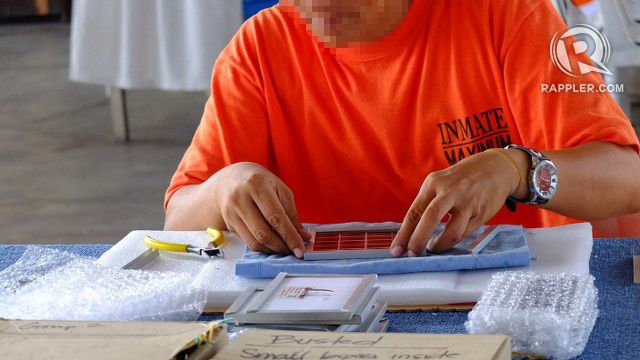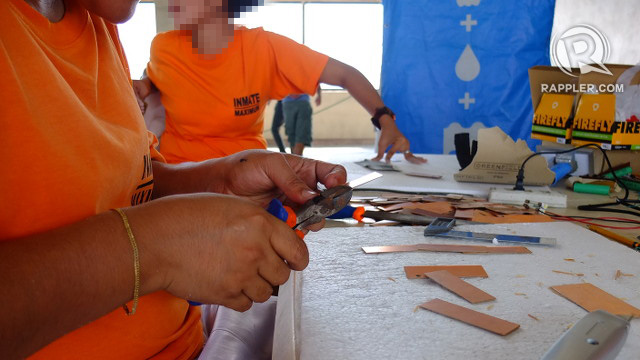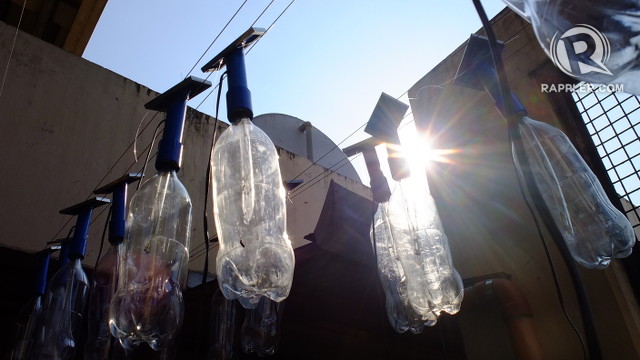SUMMARY
This is AI generated summarization, which may have errors. For context, always refer to the full article.
MANILA, Philippines – Ten women in orange are gathered around a table. Their nimble fingers are attaching metal frames to palm-sized solar panels, gluing blue pipes to the panels using epoxy, putting wires through the pipes.
Once upon a time, they were charged with drug use, illegal recruitment, and stealing. But today, and for the past 3 weeks, they have been busy making solar-powered lights for Yolanda-hit communities in Eastern Visayas.
The covered court at the top of the maximum security facility of the Correctional Institute for Women (CIW) in Mandaluyong City serves as their workshop.
The court’s large windows provide ample light for the delicate work they do. The high ceiling and open space provides much breathing room and storage for the boxes and boxes of solar-powered lamps they have finished making.
So far, 500 lamps have reached houses in Palo and shelters and bunkhouses in Tacloban, both in Leyte. Hundreds more will make their way to energy-strapped towns in Iloilo. (READ: Groups to Lacson: Tap renewable energy for Yolanda areas)
The total of 18 women trained to make the lamps can churn out 300 to 400 lamps a day. They toil from 8 am to 5 pm. To do the work they do, they went through a one-month training given by My Shelter Foundation, an organization founded by Illac Diaz of Liter of Light fame.
The idea of turning it into a livelihood program for CIW inmates, however, came from Marge Gutierrez, a volunteer lawyer for the institute.
“I found out that a majority of the women here were charged with the crime of estafa. Most of them resorted to crime because they needed money to feed their families,” Gutierrez told Rappler.
“So if we can provide them livelihood here, they can still help their families even if they are inside.”
Gutierrez approached Diaz with the idea, which was given a greater sense of urgency when Yolanda crashed into the Philippines. (WATCH: Solar panels bring hope to Haiyan-hit Guiuan)
A second chance
Charmaine (not her real name) is in charge of fixing the metal frames to the solar panels, cutting them into slender stalks, then nailing them together to form a protective border around the solar panel.
She has been inside CIW for almost a year. Before then, she had spent 7 years and 8 months inside the Las Piñas City Jail.
Almost 8 years of incarceration has taught her to face what she once denied – that she was a shabu addict.
Her work with the solar panels keeps her mind occupied, something of a luxury in a correctional facility where time tends to crawl.
“Pampalipas ng lungkot. ‘Pag wala kaming ginagawa, parang ang bagal ng oras. Naiisip namin ‘yung pamilya namin. Pero ‘pag nagtratrabaho kami, naaaliw kami,” she said.
(It helps us get by our sadness. When we aren’t doing anything, time is so slow. We think of our families. But when we are working, we get entertained somehow.)
The program is more than a way to pass time. The mechanical and electrical skills the women have learned can help them outside the facility’s walls.
As it is, they are already given an allowance for their work which Charmaine says they use to buy soap, snacks, and other little luxuries.
“Malaking tulong ito. ‘Pag lumabaas na kami, marunong na kami, may experience na kami para makapag-bagong buhay,” she said. (This is a big help. When we get out, we have skills and experience to start a new life.)
When the women leave the facility, their skills can help them get jobs in local solar panel companies. Since all the components used for the lamps are locally-sourced, the women can also choose to make solar lamps themselves and sell to their community.
Giving from the inside
Dina (not her real name) couldn’t sleep for two weeks after seeing on television that her hometown of Guiuan, Eastern Samar, was devastated by Yolanda.
Communication is tricky inside a correctional facility. She had to swallow her fear as she lined up to use the one cellular phone available for inmates.
All she had was an old number of a high school classmate who eventually because the mayor of Guiuan. Miraculously, she picked up. Dina almost fainted with relief when she heard that though her home was leveled to the ground, her family was safe.
It’s them she thinks about while framing solar panels.
“Ang sarap ng feeling, kasi kahit papaano, nakakatulong kami rito. Sabi nila, hindi kami kasama sa lipunan. Pero patunay ito na bahagi pa rin kami ng lipunan,” she said.
(It’s a great feeling because we are able to help somehow. They say we don’t belong in society. This proves we are still part of society.)
The women in orange continue their work cheerfully. They tease each other, tell stories, and gamely pose for the camera. They introduce themselves eagerly and do not hesitate to tell their life stories.
But security measures do not allow pictures of their faces to be published. Their real names cannot be used.
Though the covered court is wide and airy, it is still bound by 4 high walls and barbed wire fences.
Diaz observed while watching the women work: “Most of the big contributions in Yolanda relief aren’t from big people or big names. The real heroes are the nameless and the faceless.” – Rappler.com
Add a comment
How does this make you feel?



There are no comments yet. Add your comment to start the conversation.